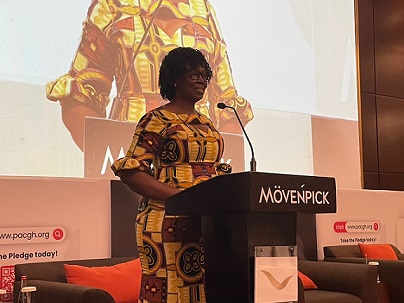Report By: Ishmael Barfi
As Ghana approaches its 2024 elections, the Ghana Anti-Corruption Coalition (GACC) is urging political leaders to prioritize anti-corruption measures. At a recent Anti-Corruption Forum in Accra, GACC’s Executive Secretary, Mrs. Beauty Emefa Narteh, emphasized the need for candidates to commit to specific, actionable steps to enhance transparency and accountability in governance.
Mrs. Narteh highlighted that candidates must go beyond promises and commit to specific, actionable measures that will significantly impact transparency and accountability. Speaking at the Anti-Corruption Forum in Accra, themed “Elections and Anti-Corruption: What is the Next Government’s Agenda?”, she emphasized the critical opportunity this election presents to set an anti-corruption mandate for Ghana. She stressed the importance of securing meaningful commitments to strengthen governance.
The forum is part of the GACC’s Pledge Against Corruption (PAC) Campaign, supported by partners such as the Africa Centre for Energy Policy (ACEP), Ghana Integrity Initiative (GII), and IMANI. The campaign aims to secure clear anti-corruption promises from candidates to serve as a foundation for future accountability.
Mrs. Narteh noted that while Ghana has committed to improving transparency, the country’s score on Transparency International’s Corruption Perception Index has shown little progress since 2020. An IMF report highlighted weak public accountability and limited citizen involvement in governance as significant challenges for Ghana.
Recent findings by the Open Budget Survey rated Ghana at 17 out of 100 for public participation in budget planning, signaling low citizen engagement in fiscal decisions. Additional studies indicate that Ghana’s debt crisis is largely driven by entrenched corruption in the public sector, adding to economic instability.
Mrs. Narteh also pointed out that despite corruption’s wide-ranging impact, it has yet to become a prominent election issue. Current research shows that Ghanaian voters are primarily focused on issues such as employment, infrastructure, healthcare, and economic management, with anti-corruption receiving little emphasis. A review of major party manifestos reveals only 32 anti-corruption pledges, with just a few addressing the enforcement of existing laws.
“Corruption is central to the issues concerning Ghanaians today,” Mrs. Narteh said, “yet it is largely missing from campaign discussions. This needs to change.”
At the Forum, a call for accountability and collective action was called for that, the forum did not only to bring corruption into the electoral spotlight but also to secure concrete commitments from political parties and their candidates. As part of the PAC Campaign, GACC and its partners will analyze current manifesto promises, clarify public expectations, and document party commitments to hold leaders accountable post-election.
“Achieving a corruption-free Ghana requires collective responsibility,” Mrs. Narteh concluded, urging citizens, institutions, and leaders alike to commit to transparency and accountability.
Through these efforts, the GACC hopes to see Ghana’s future government take bold action to address corruption, strengthen public trust, and foster sustainable development.
The Executive Director of the Ghana Integrity Initiative (GII), Mrs. Mary Addah, also called on Ghanaians and political leaders to take a firm stand against corruption as the country heads toward its 2024 elections. She highlighted the urgent need for unified, actionable commitments that go beyond empty promises, urging leaders and citizens to engage in the “Pledge Against Corruption” as a means of securing accountable governance.
Reflecting on past efforts, Mrs. Addah emphasized that while civil society organizations have fought tirelessly against corruption, the desired results have been elusive.
“We’ve fought this fight individually for years, but the dividends have been disappointing,” she remarked. “Our goal now is to come together—not just as civil society groups, but as citizens committed to the nation’s progress—to demand clear, robust, and proactive anti-corruption commitments from our leaders.”
The “Pledge Against Corruption” campaign, spearheaded by a coalition of civil society organizations, academics, private sector leaders, and concerned citizens, calls candidates to commit to bold reforms, particularly around public accountability and transparency. The campaign urges leaders to sign on to tangible, specific pledges, including the passage and enforcement of the Conduct of Public Officers Bill, which encompasses asset declaration, conflict of interest provisions, and a gift policy. Mrs. Addah noted that this bill is critical to ensuring ethical conduct within the public sector.
Source: www.thenewindependentonline.com







